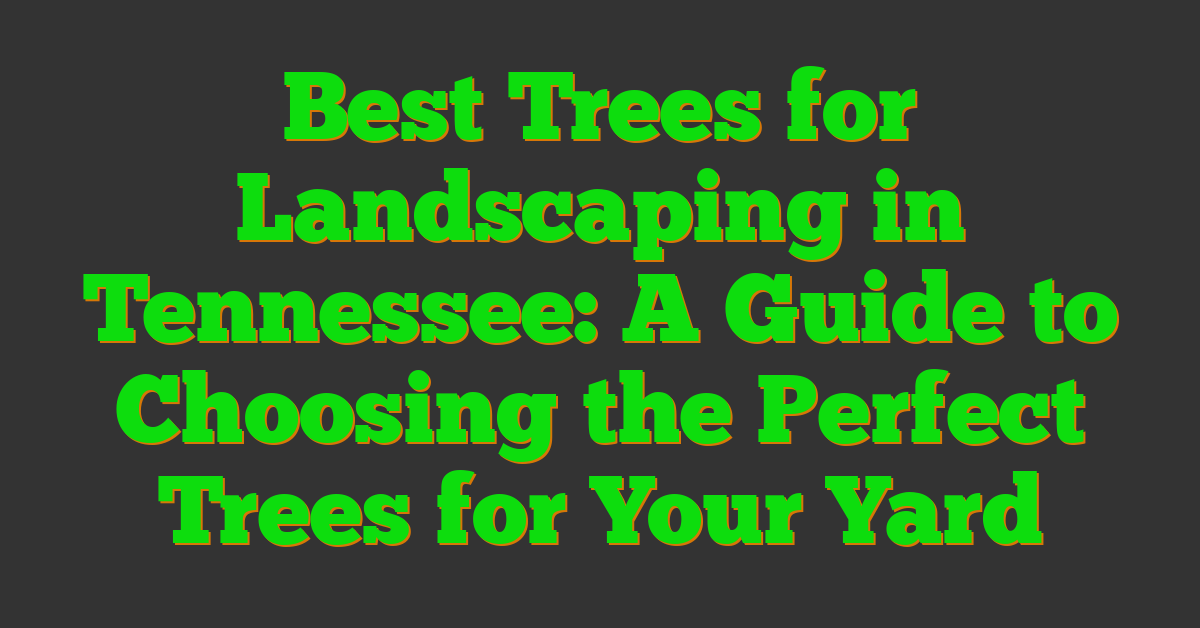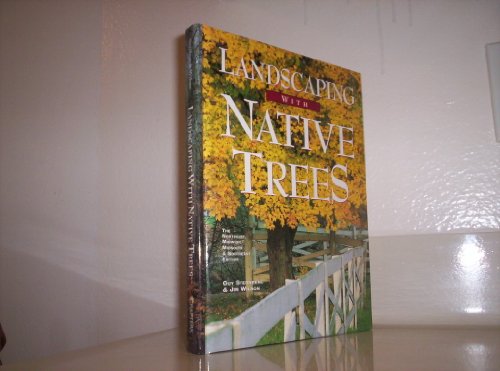If you’re planning to add some trees to your Tennessee landscaping, you’re in luck! Tennessee’s climate is ideal for a wide variety of trees, from evergreens to deciduous trees that put on a show of color in the fall. But with so many options to choose from, it can be challenging to know where to start. In this article, we’ll take a closer look at some of the best trees for landscaping in Tennessee.


When choosing trees for your Tennessee landscape, it’s essential to choose native trees that are well-suited to the state’s climate and soil conditions. Native trees are more likely to thrive in your landscape, require less maintenance, and provide a habitat for local wildlife. Understanding your landscape is also crucial, as factors like soil type, sun exposure, and moisture levels can affect tree growth. With the right tree selection and proper care, you can enjoy a beautiful, healthy landscape for years to come.
Key Takeaways:
- Choose native trees that are well-suited to Tennessee’s climate and soil conditions for a low-maintenance landscape.
- Understanding your landscape, including soil type, sun exposure, and moisture levels, is crucial for successful tree growth.
- From evergreens to deciduous trees that provide fall color, Tennessee offers a wide variety of trees for your landscaping needs.
Why Choose Native Trees for Tennessee Landscaping
https://www.youtube.com/watch?v=X-D8YAjMh-Q&embed=true
If you are a Tennessee homeowner or gardener, you should consider planting native trees in your landscape. Native trees are those that have evolved in a particular region over thousands of years and have adapted to the local climate, soil, and other environmental conditions. Here are some reasons why you should choose native trees for your Tennessee landscaping:
Adaptability
Native trees are well-adapted to the Tennessee climate, soil, and other environmental conditions. They are more likely to thrive and require less maintenance than non-native trees. Native trees are also more resistant to pests and diseases that are common in Tennessee.
Ecological Benefits
Native trees provide many ecological benefits. They provide habitat and food for wildlife, help prevent soil erosion, and improve air and water quality. They also help reduce the urban heat island effect by providing shade and cooling the air.
Aesthetics
Native trees are beautiful and can enhance the aesthetics of your landscape. They come in a variety of sizes, shapes, and colors, so you can choose a tree that fits your landscape design. Native trees also add value to your property and can increase its curb appeal.
Conservation
Planting native trees in your landscape can help conserve Tennessee’s natural heritage. Many native tree species are threatened or endangered due to habitat loss and other factors. By planting native trees, you can help preserve these species for future generations.
In summary, planting native trees in your Tennessee landscape is a smart choice. Native trees are well-adapted to the local climate, provide ecological benefits, enhance aesthetics, and help conserve Tennessee’s natural heritage.
Understanding Your Landscape
https://www.youtube.com/watch?v=e-wO-LqEQb4&embed=true
Before selecting trees to plant in your yard or garden, it’s important to understand your landscape. Consider the following factors:
Space: How much space do you have available for trees? Consider the size of the mature tree and make sure it won’t overcrowd your yard or interfere with power lines or other structures.
Sunlight: How much sunlight does your yard or garden get each day? Some trees require full sun, while others prefer partial shade. Make sure to select trees that are suitable for the amount of sunlight your landscape receives.
Soil: What type of soil do you have in your yard or garden? Some trees prefer well-draining soil, while others can tolerate heavy clay soil. Make sure to select trees that are suitable for your soil type.
Homeowner: Consider your own preferences and maintenance abilities. Do you want a low-maintenance tree or are you willing to put in the effort to maintain a more high-maintenance tree? Make sure to select trees that fit your lifestyle.
By taking these factors into consideration, you can select trees that will thrive in your landscape and provide the desired aesthetic appeal.
Popular Trees for Tennessee Landscaping
https://www.youtube.com/watch?v=8ARiEgvVT2c&embed=true
If you are looking to add some trees to your Tennessee landscaping, there are many great options to choose from. Here are some of the most popular trees for Tennessee landscapes:
Maple Trees
Maple trees are a popular choice for Tennessee landscapes because of their beautiful fall foliage. Sugar maples are particularly popular, as they have bright orange and red leaves in the fall. Red maples are also a great option, as they have red leaves in the fall and beautiful red flowers in the spring.
Sycamore Trees
Sycamore trees are another popular choice for Tennessee landscapes. They are known for their beautiful white bark and large leaves. Sycamores are also very hardy and can tolerate a wide range of soil conditions.
Oak Trees
Oak trees are a classic choice for Tennessee landscapes. They are known for their large size and strong, sturdy branches. There are many different types of oak trees to choose from, including red oak, white oak, and black oak.
« Best Trees for Landscaping in South Dakota: A Guide to Choosing the Right Trees for Your Yard Best Trees for Landscaping in Texas: Top Picks for a Lush Garden »
Bald Cypress Trees
Bald cypress trees are a great option if you are looking for a tree that can tolerate wet soil conditions. They are also known for their beautiful fall foliage, which turns a bright orange-red color.
Weeping Willow Trees
Weeping willow trees are a popular choice for Tennessee landscapes because of their graceful, drooping branches. They are also very hardy and can tolerate a wide range of soil conditions.
Ash Trees
Ash trees are a great option if you are looking for a tree with a more unique look. They have distinctive bark and large, compound leaves. There are many different types of ash trees to choose from, including white ash, green ash, and black ash.
Overall, there are many great options to choose from when it comes to trees for Tennessee landscaping. Whether you are looking for a tree with beautiful fall foliage or a tree that can tolerate wet soil conditions, there is sure to be a tree that will meet your needs.
Tree Selection Based on Size and Shape
https://www.youtube.com/watch?v=i3Om4PJRNMY&embed=true
When selecting trees for your landscaping in Tennessee, it’s important to consider the size and shape of the tree. The size of the tree will determine how much space it will take up in your yard, while the shape will affect its visual impact.
Size
When choosing a tree based on its size, consider the height and spread of the tree. A tree’s height will determine how tall it will grow, while the spread will determine how wide it will grow. It’s important to choose a tree that will fit well in your yard and not outgrow the space.
If you have a small yard, consider planting a smaller tree, such as a dogwood or redbud. These trees typically grow to a height of 20-30 feet and have a spread of 15-25 feet. If you have a larger yard, you can consider planting a larger tree, such as an oak or maple, which can grow up to 80 feet tall with a spread of 40-50 feet.
Shape
The shape of a tree can have a big impact on the overall look of your landscaping. Some trees have a more formal, upright shape, while others have a more relaxed, spreading shape.
If you’re looking for a formal look, consider planting a tree with an upright shape, such as a columnar maple or a pyramidal arborvitae. These trees have a narrow, upright shape that can add height and structure to your landscaping.
If you prefer a more natural, relaxed look, consider planting a tree with a spreading shape, such as a weeping cherry or a flowering dogwood. These trees have a more open, spreading shape that can add a soft, organic feel to your landscaping.
In conclusion, when selecting trees for your landscaping in Tennessee, consider the size and shape of the tree. Choose a tree that will fit well in your yard and complement the overall look of your landscaping.
Colorful Choices for Your Landscape
https://www.youtube.com/watch?v=TO2g_Jcw2n8&embed=true
When it comes to adding color to your landscape, you have many options in Tennessee. Here are some of the best trees that can add a pop of color to your yard:
Red Maple: The Red Maple is known for its vibrant red foliage in the fall. It’s a fast-growing tree that can reach up to 70 feet tall and 50 feet wide. This tree is perfect for adding a splash of color to your yard.
Dogwood: The Dogwood is a classic tree that is known for its beautiful blooms in the spring. The flowers come in shades of pink, white, and red, and they are sure to brighten up your yard.
Crape Myrtle: The Crape Myrtle is a popular tree in Tennessee because of its brilliant blooms in the summer. The flowers come in shades of pink, red, and white, and they can last for up to 120 days.
Tulip Poplar: The Tulip Poplar is known for its large, tulip-shaped flowers that bloom in the spring. The flowers are a brilliant yellow, and they can add a pop of color to your yard.
Sassafras: The Sassafras is a unique tree that is known for its orange hues in the fall. The leaves turn shades of orange, red, and yellow, making it a great choice for adding color to your landscape.
No matter which tree you choose, adding color to your landscape is a great way to make your yard stand out.
Evergreen Trees for Year-Round Beauty
https://www.youtube.com/watch?v=JM4pcG1HhY4&embed=true
If you’re looking to add some year-round beauty to your landscape, evergreen trees are the way to go. Not only do they provide a green backdrop that lasts all year long, but they also offer privacy and screening options for your yard. Here are some of the best evergreen trees to consider for your Tennessee landscape:
Leyland Cypress
The Leyland Cypress is an excellent option if you’re looking for a fast-growing tree that provides complete year-round privacy. Its dense branches create a green fence that is perfect for screening out unwanted views. This tree can grow up to 60 feet tall and 15 feet wide, making it a great option for larger properties.
Eastern Red Cedar
The Eastern Red Cedar is a versatile evergreen tree that can grow in a variety of conditions. It is perfect for use as a privacy screen or windbreak, and its dense branches provide year-round greenery. This tree can grow up to 50 feet tall and prefers full sun and well-drained soil.
Norway Spruce
The Norway Spruce is a popular evergreen tree that is known for its conical shape and dark green needles. It is a great option for screening out unwanted views and providing privacy. This tree can grow up to 60 feet tall and prefers full sun and well-drained soil.
Arizona Cypress
The Arizona Cypress is a drought-tolerant evergreen tree that is perfect for Tennessee’s hot summers. Its blue-green foliage provides year-round beauty, and it can be used as a privacy screen or windbreak. This tree can grow up to 40 feet tall and prefers full sun and well-drained soil.
Deodar Cedar
The Deodar Cedar is a beautiful evergreen tree that is perfect for adding some drama to your landscape. Its weeping branches and blue-green needles provide year-round interest, and it can be used as a privacy screen or windbreak. This tree can grow up to 80 feet tall and prefers full sun and well-drained soil.
Overall, evergreen trees are a great addition to any Tennessee landscape. Whether you’re looking for privacy, screening, or just some year-round beauty, there is an evergreen tree that will fit your needs.
Deciduous Trees for Seasonal Charm
https://www.youtube.com/watch?v=ogDDwEayzPA&embed=true
If you’re looking for trees that will add some seasonal charm to your landscape, deciduous trees are an excellent choice. Deciduous trees are those that lose their leaves in the fall, and they can provide beautiful colors in the autumn months. Here are some of the best deciduous trees for seasonal charm in Tennessee:
Red Maple
The Red Maple is a popular shade tree that can grow up to 60 feet tall. It is known for its bright red foliage in the fall, which can add a beautiful pop of color to your landscape. This tree can grow in a variety of soil types and is a medium grower, making it a great option for those who want a tree that will grow relatively quickly.
Dogwood
The Dogwood is a smaller tree that is known for its beautiful pink or white flowers in the spring. In the fall, the leaves turn a deep red color, adding some seasonal charm to your landscape. This tree can grow up to 30 feet tall and is a great option for those who want a smaller tree that will still provide some shade.
Sugar Maple
The Sugar Maple is another popular shade tree that is known for its beautiful fall foliage. The leaves turn shades of yellow, orange, and red, making it a great option for those who want a tree that will add some color to their landscape. This tree can grow up to 80 feet tall and is a medium grower, meaning that it will grow relatively quickly.
Sweetgum
The Sweetgum is a unique tree that is known for its star-shaped leaves and its spiky fruit. In the fall, the leaves turn shades of yellow, orange, and red, adding some seasonal charm to your landscape. This tree can grow up to 75 feet tall and is a medium grower, making it a great option for those who want a tree that will grow relatively quickly.
Oak
Oaks are a classic shade tree that can provide beautiful fall foliage. The leaves turn shades of red, orange, and yellow, adding some seasonal charm to your landscape. Oaks can grow up to 100 feet tall, making them a great option for those who want a larger tree that will provide plenty of shade.
Overall, deciduous trees are an excellent choice for those who want to add some seasonal charm to their landscape. Whether you choose a Red Maple, Dogwood, Sugar Maple, Sweetgum, or Oak, you’re sure to enjoy the beautiful fall foliage that these trees provide.
Trees for Different Sunlight Conditions
https://www.youtube.com/watch?v=ltXaXdAqNXQ&embed=true
When selecting trees for your Tennessee landscape, it’s important to consider the amount of sunlight the area receives. Some trees thrive in full sun, while others prefer partial shade. Here are some trees that will do well in different sunlight conditions:
Full Sun
If you have an area that receives full sun, these trees will do well:
- Red Maple: This tree is known for its vibrant fall foliage and can grow up to 50 feet tall. It can tolerate a wide range of soil types and is relatively low-maintenance.
- Sweetgum: This tree features star-shaped leaves that turn shades of yellow, orange, and red in the fall. It can grow up to 75 feet tall and prefers well-drained soil.
- Bald Cypress: This tree is known for its distinctive bark and can grow up to 100 feet tall. It prefers moist soil and can tolerate flooding.
Partial Shade
If you have an area that receives partial shade, these trees will do well:
- Dogwood: This tree is known for its showy spring blooms and can grow up to 30 feet tall. It prefers well-drained soil and can tolerate some drought.
- Eastern White Pine: This tree can grow up to 100 feet tall and is known for its soft needles and attractive cones. It prefers slightly acidic soil and can tolerate some shade.
- Saucer Magnolia: This tree features large, showy blooms in the spring and can grow up to 30 feet tall. It prefers well-drained soil and can tolerate some shade.
No matter what your sunlight conditions are, there are plenty of trees that will thrive in your Tennessee landscape. Choose the right tree for your space and enjoy the beauty it brings to your yard.
Maintenance and Care of Landscape Trees

Taking care of your landscape trees is essential to ensure their health and longevity. Proper maintenance can also enhance the beauty of your property and increase the value of your home. Here are some tips to help you care for your trees:
Mulch
Mulching is an effective way to retain moisture in the soil and suppress weeds around your trees. Apply a 2-3 inch layer of mulch around the base of the tree, but avoid piling it against the trunk. This can lead to moisture buildup and invite pests and diseases.
Watering
Proper watering is crucial for the health of your trees, especially during the first few years after planting. Water your trees deeply and regularly, especially during dry spells. A good rule of thumb is to provide 1 inch of water per week, either through rainfall or irrigation.
Pruning
Pruning is important to maintain the shape and structure of your trees, remove dead or damaged branches, and promote healthy growth. It’s best to prune your trees during their dormant season, usually in late winter or early spring. Avoid pruning in the fall, as this can stimulate new growth that may not have time to harden off before winter.
Fertilization
Fertilization can help your trees grow faster and healthier, but it should be done with care. Too much fertilizer can burn the roots and damage the tree. It’s best to have your soil tested to determine what nutrients your trees need, and then apply a balanced fertilizer accordingly.
By following these simple tips, you can keep your landscape trees healthy and beautiful for years to come.
The Role of Trees in Home Landscaping
https://www.youtube.com/watch?v=OlzNs7rKIi0&embed=true
Trees are an essential part of any residential landscape. They provide numerous visual benefits and add to the aesthetics of your property. Trees not only enhance the beauty of your home, but they can also increase the value of your property.
One of the most significant benefits of trees is the shade they provide. Trees can significantly reduce the amount of air conditioning you need to keep your home cool during the summer months. This can help you save on energy costs and reduce your carbon footprint.
Trees also provide a habitat for wildlife, such as birds and squirrels. By planting trees in your yard, you can create a mini-ecosystem that supports local wildlife. This can be especially beneficial in urban areas where wildlife habitats are often scarce.
In addition to their practical benefits, trees also add to the overall beauty of your landscape. They come in a wide variety of shapes, sizes, and colors, and can be used to create a focal point in your yard.
Overall, trees are an excellent addition to any home landscape. They provide a range of benefits, from practical energy savings to aesthetic beauty. By planting trees in your yard, you can create a beautiful and functional space that supports both you and the local environment.
Frequently Asked Questions
https://www.youtube.com/watch?v=QRl3puYcC6M&embed=true
What are some small native trees that thrive in Tennessee landscaping?
If you’re looking for small trees that can add beauty to your Tennessee landscaping, you might want to consider the American hornbeam, the redbud, or the dogwood. These trees are all native to Tennessee and can thrive in a variety of soil types.
What are the best low maintenance shrubs for Tennessee landscaping?
If you’re looking for low maintenance shrubs for your Tennessee landscaping, you might want to consider the dwarf yaupon holly, the inkberry, or the winterberry. These shrubs are all native to Tennessee and require little maintenance once established.
What are some of the most common native Tennessee trees for landscaping?
Some of the most common native Tennessee trees for landscaping include the red maple, the white oak, and the black gum. These trees are all well-suited to the Tennessee climate and can provide shade, beauty, and environmental benefits to your landscape.
What are the best fruit trees to grow in Tennessee landscaping?
If you’re interested in growing fruit trees in your Tennessee landscape, you might want to consider the apple, the peach, or the cherry. These fruit trees are all well-suited to the Tennessee climate and can provide delicious fruit for you and your family to enjoy.
What are some native evergreen shrubs that are good for Tennessee landscaping?
If you’re looking for evergreen shrubs that can add beauty and structure to your Tennessee landscaping, you might want to consider the American holly, the eastern red cedar, or the inkberry. These shrubs are all native to Tennessee and can provide year-round interest to your landscape.
What are the fastest growing trees in Tennessee landscaping?
If you’re looking for fast-growing trees to provide shade and beauty to your Tennessee landscape, you might want to consider the silver maple, the river birch, or the sweetgum. These trees can all grow quickly and provide benefits to your landscape in a relatively short amount of time.
















